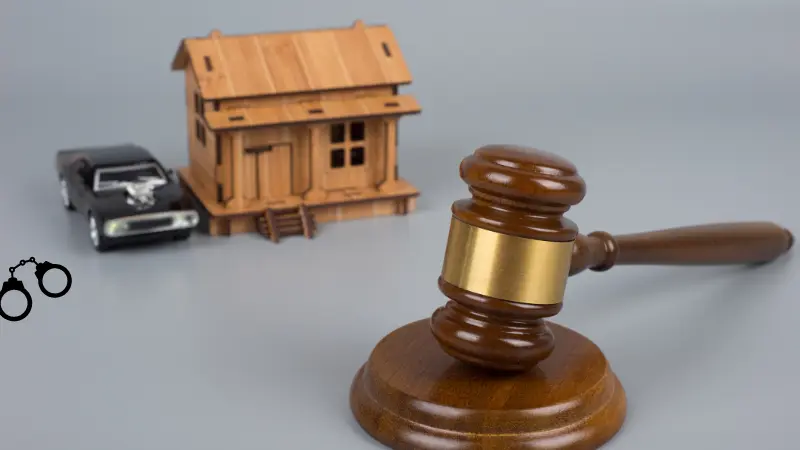If you go to jail for over a year, what happens to your house, car, and everything you own? This question comes up in the mind of all when preparing for jail time or when someone close is doing time. What happens to your property if you go to jail depends on the crime committed and legal proceedings.
Here is what will happen to everything you own during your time in. Let’s talk about your house, cars, finances, and other things you might own. But this is not legal advice.
What Happens To Your Property If You Go To Jail?

The experience of going to jail or prison has consequences beyond the loss of freedom. One concern for individuals facing a long period of incarceration is the fate of their assets, including their house, car, and everything they own. The complex system of asset seizure and forfeiture laws can leave individuals uncertain about what will happen to their properties, bank accounts, investments, and personal belongings while they are in.
Legal Proceedings: Asset Seizure And Forfeiture Laws
When it comes to criminal activities, asset forfeiture laws provide a way for the government to seize and potentially forfeit property that is connected to criminal activities. The purpose of these laws is to disrupt criminal networks, deter illegal activities, and ensure that individuals do not benefit from the proceeds of their illegal actions.
Types Of Crimes That Trigger Asset Seizures
Asset seizures and forfeitures typically occur in cases involving serious crimes such as
- drug trafficking
- money laundering
- organized crime
- fraud
These crimes are often associated with financial gains, making it crucial to remove the ill-gotten assets from the hands of criminals.
Read:
- Buying A House As A Felon
- Are Transgender Felons Sent To Male Or Female Prison?
- Can You Be A Foster Parent With A Felony?
- Relocating To Canada As A Felon
- Why Do Criminal Lawyers Most Often Ask Their Clients To Plead Guilty?
Due Process And Legal Protections For Asset Owners
While asset forfeiture is a powerful tool for law enforcement, there are legal protections in place to safeguard the rights of asset owners. Due process is a fundamental principle that ensures individuals have a fair opportunity to contest the seizure of their assets.
If you’re facing asset forfeiture, it’s essential to seek legal counsel to understand and exercise your rights effectively.
What Happens To Your House When You Go To Jail?
If you are not able to take care of these things before going to jail and have no one to do it for you, your house and car will probably be repossessed. Even if you own the home outright.
When it comes to your home, the government can seize and potentially forfeit the property if there is evidence linking it to criminal activity. It’s important to know that simply going to jail does not automatically result in the loss of your home. But, if your house was acquired through the proceeds of illegal activities or used as collateral for criminal conduct, it could be subject to seizure.
Being locked up makes it difficult to maintain mortgage payments or handle property-related issues, putting your homeownership at risk.
It is great to have a support system in place, such as family or trusted friends, who can assist in managing your property affairs during your absence.
If you are worried about safeguarding your possessions while you are in jail, you can seek assistance from legal aid groups or pro bono lawyers. They can help you through the legal process and protect your property.
What Will Happen To Your Car When You Go To Jail?
Similar to property, vehicles can also be subject to seizure and potential forfeiture. If no takes care of your vehicle or cars when you’re in, it might be idle with the cops for a short while. It might be repossessed by the bank and sold off too after a while when your account runs low.
If your vehicle is possessed, it will be temporarily stored by law enforcement. Depending on the jurisdiction, there may be procedures in place for you to retrieve your vehicle during your incarceration or after your release. These procedures typically involve proving ownership, paying any associated fees, and complying with specific conditions set by the court. In cases where vehicles are forfeited, they are often sold at government auctions. The auctions provide an opportunity for the public to purchase seized vehicles, with the proceeds going toward law enforcement efforts.
What Happens To Your Finances When You Are In Jail For Over A Year?
When facing a lengthy jail term, you may wonder what happens to your bank accounts and financial assets. Well, in some cases your account is not frozen depending on the crime and sentencing. Crimes that deal with fraud, laundering, and theft will tend to be frozen. Your bank accounts will be frozen to prevent any unauthorized transactions while you’re behind bars. So if you were planning on hitting up the prison commissary with your hard-earned savings, think again.
It’s not just your bank accounts that are at risk; investments and retirement funds can also take a hit. If you have any assets linked to illegal activities or acquired through illicit means, there’s a good chance they will be confiscated. Your dreams of sipping piña coladas on a tropical beach with your retirement nest egg might get crushed like a bug.
If you’ve got a spouse or next of kin linked to your assets, there might be hope. If the person handles your finances, and investment well and the account is not frozen.
So, how can you protect your hard-earned financial resources from the greedy grasp of the legal system? Well, it’s a bit like trying to sneak a cookie from the cookie jar without getting caught. You could consult an asset protection specialist or lawyer who can help you navigate the legal maze and find ways to shield your assets. Just remember, they might frown upon hiding your yacht under your neighbor’s name.
Personal Belongings: What Happens to Your Possessions?
Now, let’s move on to the burning question: what happens to your beloved possessions while you’re stuck in the slammer? Each correctional facility has its policies and procedures for handling inmates’ personal belongings. They might allow you to keep a limited number of items, like your toothbrush and underwear, but don’t expect them to roll out the red carpet for your expensive collection of vintage action figures.
Storage, Disposal, Or Transfer Of Personal Belongings
If your personal belongings exceed the prison’s storage capacity, they might end up in a storage facility, collecting dust and reminding you of your freedom. Alternatively, the facility can choose to dispose of or donate them to charity. So, if you’ve always wanted to bless someone with your extensive collection of novelty socks, now might be your chance.
Less, I forget to mention personal properties in your storage unit. Any property in a storage unit will be auctioned or dumped when the fees are no longer paid.
Potential Solutions

Take time to plan when given time to get yourself together before being locked up. Seek legal counsel from someone who knows their stuff. They can guide you through asset protection planning to minimize the impact of incarceration on your financial well-being. It’s like getting an insurance policy for your hard-earned assets but without the annoying gecko commercials.
Quora gives stories and answers from individuals who overcame the same situation.
Renting your property could be a good way to cash out and keep your bills paid while you’re in. This can be done if your time ain’t up to more than a year.
One potential solution is transferring assets or establishing trusts before you find yourself in prison stripes. By legally moving your assets into the hands of trusted individuals or setting up a trust, you may be able to keep them out of reach from the long arm of the law. Just ensure those trusted individuals don’t have a habit of mysteriously disappearing in the Bermuda Triangle.
Let your family or trusted friends handle your properties when you’re away if they agree.
In conclusion, the major way of solution is seeking legal advice, which is best, and getting trusted family and friends involved to help. When push comes to shove you’d know who’s got your back.

I’m Cli, also known as Castro. An author of felhus.com
I’ve got great passion for felons and wanna see them live absolutely normal again.
